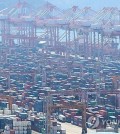- California Assembly OKs highest minimum wage in nation
- S. Korea unveils first graphic cigarette warnings
- US joins with South Korea, Japan in bid to deter North Korea
- LPGA golfer Chun In-gee finally back in action
- S. Korea won’t be top seed in final World Cup qualification round
- US men’s soccer misses 2nd straight Olympics
- US back on track in qualifying with 4-0 win over Guatemala
- High-intensity workout injuries spawn cottage industry
- CDC expands range of Zika mosquitoes into parts of Northeast
- Who knew? ‘The Walking Dead’ is helping families connect
Korea reveals $40B stimulus package
By Yoon Ja-young

President Park Geun-hye and Finance Minister Choi Kyung-hwan enter the Sejong Government Complex to attend a meeting of ministers to discuss the necessary steps to revive the economy, Thursday. (Yonhap)
The government announced a 41 trillion won ($40 billion) stimulus package to revive the swooning economy, Thursday.
“Our economy is currently stuck in the doldrums. The economy is recovering, but the pace is too slow,” new finance minister Choi Kyung-hwan said at a briefing.
Choi, also a deputy premier, vowed to take all possible fiscal and financial measures including tax and deregulation policies.
Under Choi’s plan, the money will be used to revive domestic consumption.
Of it, 12 trillion won will be allocated through fiscal policies, while 29 trillion won will be used to bolster financial measures such as loans for small- and medium-sized enterprises.
Choi said the government will “shift to more aggressive macroeconomic policies, and continue this expansionary mode until its effect materializes.”
He disclosed a plan to use tax measures to get corporate gains shared with households.
For instance, businesses that raised wages at a rate above the average for the past three years will get tax deductions.
Businesses that sit on cash reserves without investing or using them for higher wages and dividends will face additional taxes.
The finance minister had already hinted at this when commenting on what he intended to do about the increasing financial imbalance between corporations and households.
The country’s top conglomerates have seen their internal reserves, comprised of profits and capital surpluses, double during the past five years, while households have been complaining that they have no cash to spend.
“The systematic and comprehensive problems that have accumulated so far have taken away the vitality of households and businesses, making a sluggish domestic economy a perennial problem,” he said.
Choi warned that the nation could follow in the footsteps of Japan, which suffered from a so-called “lost two decades.”
The government plans to increase tax deductions for spending on credit and debit cards, a measure aimed at boosting consumption.
To tackle the problem of non-regular workers, the government plans to support businesses that change their status to that of regular employees.
Around 6 million workers in the country are non-regular employees, getting lower wages and fewer benefits than regular workers.
The government will ease the loan-to-value ratio (LTV) and debt-to-income ratio (DTI) for mortgages. These restrict how much money a person can borrow when buying a house.
Though the restrictions helped suppress a housing bubble, there has been demand that they be eased to boost the real estate market.
The government raised the LTV to 70 and the DTI to 60 percent, allowing people to borrow more money.
It also unveiled mega infrastructure projects, including a 2.6 trillion won highway project linking Pyeongtaek in Gyeonggi Province to Buyeo in South Chungcheong Province, and a GTX train project in the metropolitan area.
















